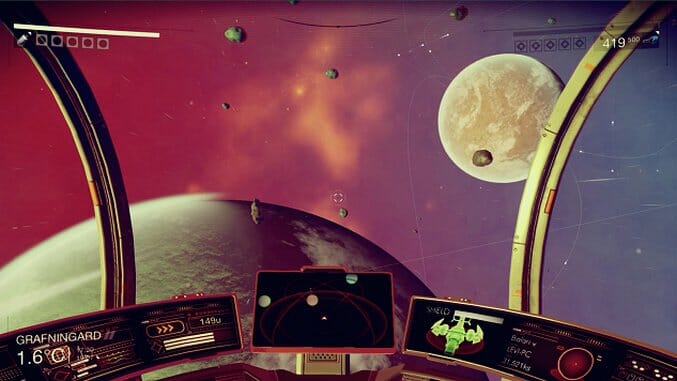The Post-Rock Aesthetic of No Man’s Sky

You may have heard of an exuberantly vulgar game called Keyboard Drumset Fucking Werewolf, courtesy of Swedish developer Cactus and one half of Dennaton Games, the studio behind the psychedelic Hotline Miami. Keyboard Drumset Fucking Werewolf is jarringly, explosively punk, both in its execution and style. Like those aggressive punk songs that are barely 60 seconds long, the game can be completed in mere minutes if you are skilled enough; its play style changes haphazardly; and it is accompanied by an absolutely abrasive and chaotic soundtrack. Brimming with so much of the devil-may-care swagger reminiscent of the genre, this game is punk personified.
(And if you haven’t played it, you probably should. Here you go.)
In the same vein, the highly anticipated space exploration game, No Man’s Sky is the embodiment of post-rock music, a nebulous genre that revels in its ambiguity and lack of resemblance to traditional rock music. Often described with tags like “atmospheric,” “immersive” and “amorphous” by post-rock fans, the genre actually has plenty in common with the videogame; in fact, these words have already been part of the rhetoric that makes up No Man’s Sky.
Is it any surprise, then, that creator Sean Murray would enlist the post-rock outfit 65daysofstatic to craft the game’s soundtrack? I think not. The collaboration between 65daysofstatic and Hello Games, the studio behind No Man’s Sky, is clearly a marriage born out of love for both music and videogames. Heck, even the No Man’s Sky name sounds like a lofty post-rock band (I haven’t found one yet, though. Hit me up if that is your band name or musical moniker).
So what is post-rock? Even for music aficionados, this label can be a tad difficult to interpret, due to how gnarled the naming conventions for music genres have become. In a nutshell, post-rock is music played on traditional rock instruments but heavily inspired by other styles and genres. In its most famous form it’s largely instrumental and at times anthemic—it’s often easy to imagine post-rock as the score to a movie you haven’t seen yet, and that probably hasn’t even been made. Post-rock acts like Mogwai and Explosions In The Sky employ repetitive musical motifs to build up a soundscape that can go from soothingly quiet to cavernously loud within minutes. Shying away from the typical verse-chorus structure of rock music, songs also do not usually follow a singular narrative, which allows listeners to ascribe their own meaning and interpretations. And this ambiguity is why live performances by post-rock bands can be such mind-blowing experiences. Great post-rock bands are adept at regulating the emotions of their audience, improvising and tweaking their songs such that the build-ups—and the eventual, cathartic release—are perfectly timed. The result is a transcendental experience that is, honestly, quite indescribable by mere human language.
This may sound a little too orgasmic, but I do believe that No Man’s Sky can elicit the same emotions from its players. Like the genre’s renouncement of narrative lyrics, No Man’s Sky also eschews a grand, overarching quest or plot in favor of exploration. According to Murray, players are free to discover the universe on their own terms. In fact, with 18 quintillion planets to roam through, the game can literally go on for millennia if you want to explore ‘em all—or until you decide that the need for real-life sustenance is more compelling than being a virtual spacefarer. Sure, there are some general directions to follow, but your No Man’s Sky experience is probably more tied to your actions and decisions than in any other videogames. Want to be the aliens’ go-to guy for a cosmic party? Glyphs inscribed on a monolith can help you pick up foreign languages to converse with them. Keen to brutalize every ship and poor, unsuspecting animal in your path? Upgrade your weapons with fanatical glee, until you’re wielding a mammoth tool the size of Jared Leto’s ego. Accompanied by the atmospheric, heart-thumping soundtrack by 65daysofstatic, you are free to traverse the planets the way you want to, from trying to discover as many planets as quickly as possible, to exploring every single inch of a single planet before shuffling off to the next.
No Man’s Sky prioritizes a spirit of exploration similar to the pioneering days of post-rock. When the members of bands like Slint, Tortoise and Stereolab tired of the traditional rock and punk, they explored other styles of music and laid the groundwork for something new and unusual. They went beyond the boundaries of rock, incorporating different rhythms and textures, slathering such effects as reverb and delay on their guitars in abundance, and exploring the monolithic drone of both 1960s minimalism and Indian classical music. Lyrics, when they existed, were stream-of-consciousness, often spoken in a muffled hush. They tossed out the verse-chorus-verse-chorus-bridge-chorus song structure, sprinkling in influences from jazz, krautrock, experimental and classical music. They created rock music that is, at its core, not quite rock music.

